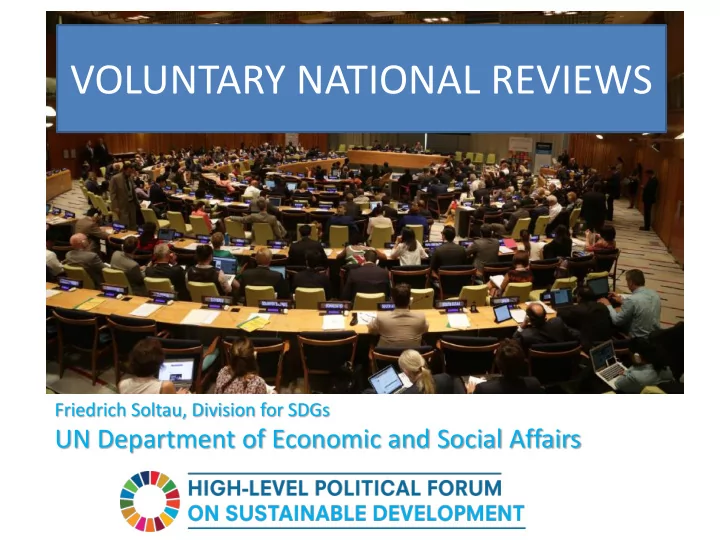

VOLUNTARY NATIONAL REVIEWS Friedrich Soltau, Division for SDGs UN Department of Economic and Social Affairs
2018 High-Level Political Forum • The 2018 session will take place 9-18 July at UN Headquarters in New York • The theme is “Transformation towards sustainable and resilient societies ” • 47 countries will present their voluntary national reviews • Set of goals for the in-depth review of progress: • Draft programme: https://sustainabledevelopment.un.org/hlpf/2018
HLPF Voluntary National Reviews • VNRs are state-led : country driven reviews of progress at national and sub- national levels, • Learning experience : facilitate the sharing of experiences, including successes, challenges and lessons learned, part of a process • National circumstances : reviews in accordance with national circumstances, policies and priorities, together with relevant partners
BENEFITS OF THE VNRS • CATALYZER – the preparatory process provides a great chance for including all relevant stakeholders in the SDG implementation • STOCKTAKING – for many countries the VNR has been a kick-starter for mapping existing policies and their compatibility with the SDGs, implementation gaps and data availability • COORDINATION – VNR preparation requires a coordinated effort and for many countries the institutional arrangements made have proved useful also for SDG implementation • “WHOLE -OF- GOVERNMENT” APPROACH – VNR provides a chance for obtaining buy-in in from civil servants and creating incentives for integrated policy-making and service delivery • AREAS FOR SUPPORT – tool for identifying and communicating the areas in which the country requires additional support for implementation • COMMUNICATION TOOL of the agenda to citizens, civil society, academia, sub-national and local governments etc.
UN Secretary-General ’ s voluntary common reporting guidelines • Help countries structure VNR reports HLPF • Promote comparability and consistency • Voluntary nature of process - each country free to decide on scope of its review and format for presentation of findings • Updated for 2018: analysis/explanation of policies, addressing “leaving no one behind” (LNOB), cover all SDGs
LESSONS LEARNED • Designate coordinator(s) and the “penholder(s)” • Engage a broad range of stakeholders early on • Focus on quality, not quantity • Include analysis, explanations, lessons learned & examples (minimize listing of strategies, etc.) • Cover strengths and weaknesses • Include a statistical annex, if suitable • Identify areas where additional support is needed • Spell out the next steps in implementation
VNR Handbook/Manuel/ ليلد https://sustainabledevelopment.un.org/vnrs/
Thank you! We look forward to your participation! For the latest information, visit https://sustainabledevelopment.un.org/hlpf/2018
Recommend
More recommend